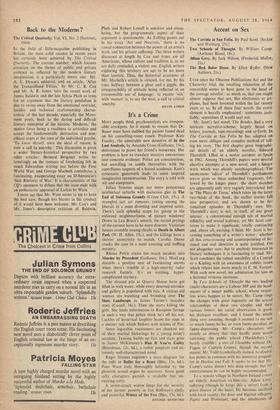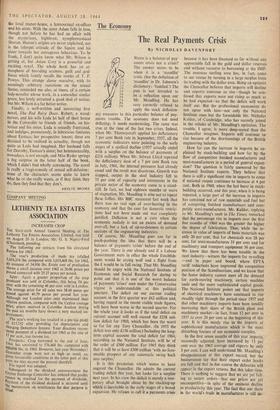Accent on Sex
EVER since the Obscene Publications Act and the Chatterley trial, the resulting relaxation of the censorship seems to have gone to the head of the average novelist: so much so, that one might almost suppose that sex, like electronics or jet- planes, had been invented within the last twenty years or so. In all these four novels the erotic element is heavily emphasised: sometimes justi- fiably, sometimes (1 would say) not.
Mr. Scott's last novel, The Bender, had a very intricate narrative-scheme, largely based on letters, journals, tape-recordings and so forth. In The Corrida at San Feliu he has adopted an even more oblique and complex method of tell- ing his story. The first chapter gives biographi- cal details of an elderly novelist, Edward Thornhill, killed in a motor accident in Spain in 1962. Among Thornhill's papers were several abortive attempts at a new novel, and a longer work which was plainly autobiographical. The anonymous 'editor' of Thornhill's posthumous antvre gives us these unfinished fragments, fol- lowed by the longer piece: the short sketches are apparently only very vaguely interrelated, but in The Plaza de Toros,' which takes the latter two-thirds of the book, the earlier stories fall into perspective, and are shown to be fic- tionalised episodes in Thornhill's own life. Thornhill's story is not, in itself, of any great interest: a conventional enough tale of marital infidelity and sexual jealousy; yet Mr. Scott con- trives to make it significant, totally convincing and, above all, excising. .1 think Mr. Scott is be- coming something of a writer's writer: whether all this criss-crossing and counterpointing of fic- tional and real identities is quite justified, I'm not altogether sure; but to anybody interested in literary techniques it is fascinating to read. Mr. Scott combines the robust sensibility of a Conrad or a Kipling with an awareness of subtler issues which relates him more nearly to E. M. Forster. With each new novel, my admiration for him as a fictional virtuoso increases.
In Two Schools of Thought the two leading (male) characters are a Labour MP and the head- master of a minor public school, whose respec- tive wives happen to be sisters. Mr. Camp rings the changes with great ingenuity on the sexual relationships of these two couples and their various lovers; his social observation is good, his dialogue excellent. and I found the whole thing very amusing, though it seemed to me not so much funny-ha-ha, or even funny-peculiar, as funny-depressing. Mr. Camp's characters are mostly so dreary that they hardly seem worth satirising; the public school ('Hucklebury) is barely credible: a sort of Ilanabba without Dr. Fagan or Captain Grimes, though the second master, Mr. Todd (symbolically named, no doubt). has points in common with his immortal progeni- tor in Decline and Fall. It seems to me that Mr. Camp's satire doesn't bite deep enough; but for entertainment he can be highly recommended.
To a remote village in Northern Ireland comes an elderly American ex-film-star, Adam CircY, suffering (though he keeps this a secret) from a grave disease of the heart. He becomes involved with local society: the dour and bigoted villagers. Papist and Protestant, and the inhabitants of the local manor-house, a homosexual ex-officer and his sister. With the sister Adam falls in love, though not before he has had an affair with the mysterious, highbrow, nymphornaniacal Sharon. Sharon's origins are never explained, nor is the tolerant. attitude of the Squire and his sister towards her outrageous behaviour. To be frank, I don't quite know what Mr. Wilson is getting at, but Adam Grey is a powerful and
• exciting novel. The whole book has an at-
, mosphere of brooding sexiness, guilt and god- liness which faintly recalls the stories of T. F. Powys. This strange douse macabre, with its seemingly arbitrary variations on the sexual theme, reminded me also, at times, of a certain
• lady-novelist whose work, in a somewhat similar genre, has lately attracted a good deal of notice; but Mr. Wilson is a far better writer.
Finally, a well-written and interesting first novel, The Red Baize Door. Robert, a wood- carver, and his wife Leda let half of their house in the Cotswolds to friends of friends, an his- torian and his sister. Leda is sexually frustrated, and indulges, prematurely, in lubricious fantasies about Eustace, her prospective tenant; these are destined to be realised in actuality, though not quite as Leda had imagined. Her husband falls for Dorothy, Eustace's sister; but heterosexuality, nowadays, is not enough, and Miss Ryder springs a big surprise in the latter half of the book, Which I didn't find wholly convincing. The novel is really a tragi-comedy of sexual self-delusion: none of the characters seems quite to know What he or she really wants, or if they think they do, then they find that they don't.
JOCELYN BROOKE



































 Previous page
Previous page